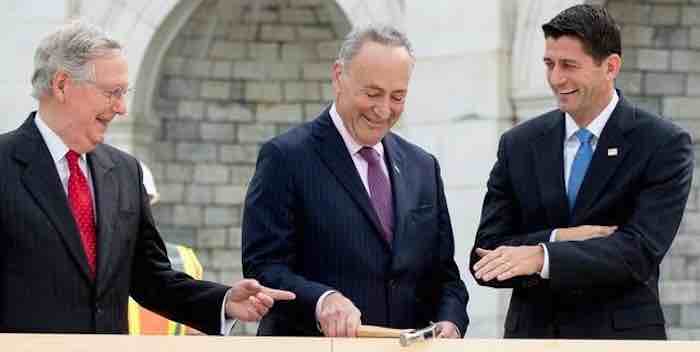 Although we've already told you there is a silver lining or two, the fact remains that the two-year budget deal negotiated by Republican and Democrat leaders in Congress is exactly the opposite of what the country needs right now. It's true that it will more adequately fund the military, and that's important. But in order to get there, Republicans basically allowed the Democrats to remove all restraints on federal spending, while messing up the revenue stream by extending 35 tax breaks that were supposed to expire.
This is exactly the opposite of the fiscal discipline we need, and it's exactly the opposite of the tax simplification we should be moving toward.
Although we've already told you there is a silver lining or two, the fact remains that the two-year budget deal negotiated by Republican and Democrat leaders in Congress is exactly the opposite of what the country needs right now. It's true that it will more adequately fund the military, and that's important. But in order to get there, Republicans basically allowed the Democrats to remove all restraints on federal spending, while messing up the revenue stream by extending 35 tax breaks that were supposed to expire.
This is exactly the opposite of the fiscal discipline we need, and it's exactly the opposite of the tax simplification we should be moving toward.Democrats backed up the truck for funding on everything from community health centers to billions on child-care grants to $20 billion for infrastructure. The tally comes to $131 billion more in discretionary spending over the next two years. Democrats wanted dollar for dollar parity with defense spending. So in the silver-lining department the GOP at least managed to get more for the Pentagon, where cuts have been harsher. On the long list of the Democratic haul: An additional four-year extension for the children’s health insurance program, or CHIP, which was recently extended for six years. That means 10 more years of a separate health program for children, though many Democrats said that ObamaCare would provide affordable coverage that would make the CHIP program unnecessary. Now we get both for the long run.Meanwhile, the Daily Signal explains how Congress is giving CPR to tax breaks that are supposed be going away:
The extenders are largely a subsidy package for the energy industry. Two-thirds of the provisions are energy related. The current proposal would extend special credits to solar lighting systems, fuel cells, geothermal heat pumps, and small wind power, among others. Also included in the list of things Congress wants to use your money to subsidize: biofuel, rum producers, private railroads, and nuclear power.
Even if you think some of these things might be worthy of support, governments do no service to the industries or technologies they choose to subsidize. Subsidies for a specific resource or technology end up distorting private-sector investment to align with political agendas rather than market realities. Businesses end up competing for government subsidies rather than your business as a customer. Strong, viable businesses cannot be created from on high in Washington. The government has a long history of being a poor judge of private market success. Even to meet the stated goals of promoting investment in their preferred industries, Congress gets the economics wrong. The proposal would retroactively extend 20 temporary tax credits which expired at the end of 2016.This is a political deal through and through. Both sides know that the politics of a shutdown are bad for everyone, and both sides know they'll be lauded by the media if they avoid budget drama and keep the government running. The objective here is to be able to stand up and say they worked out a deal, and "proved they could govern."
Herman Cain’s column is distributed by CainTV, which can be found at Herman Cain